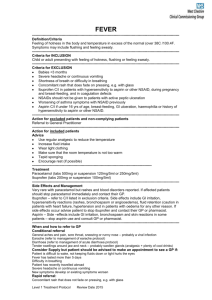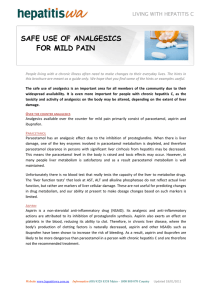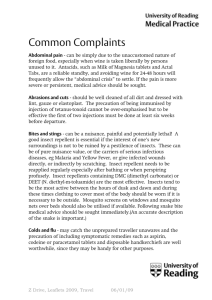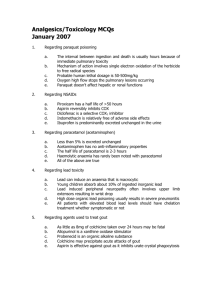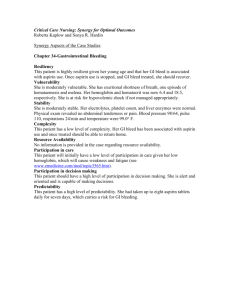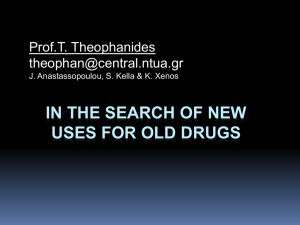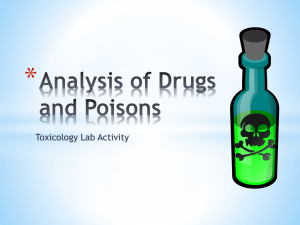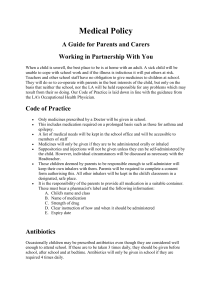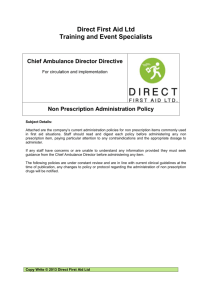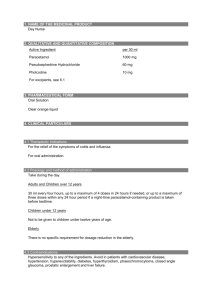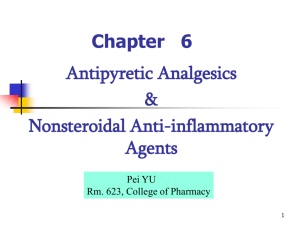MS Word - Graphic Science
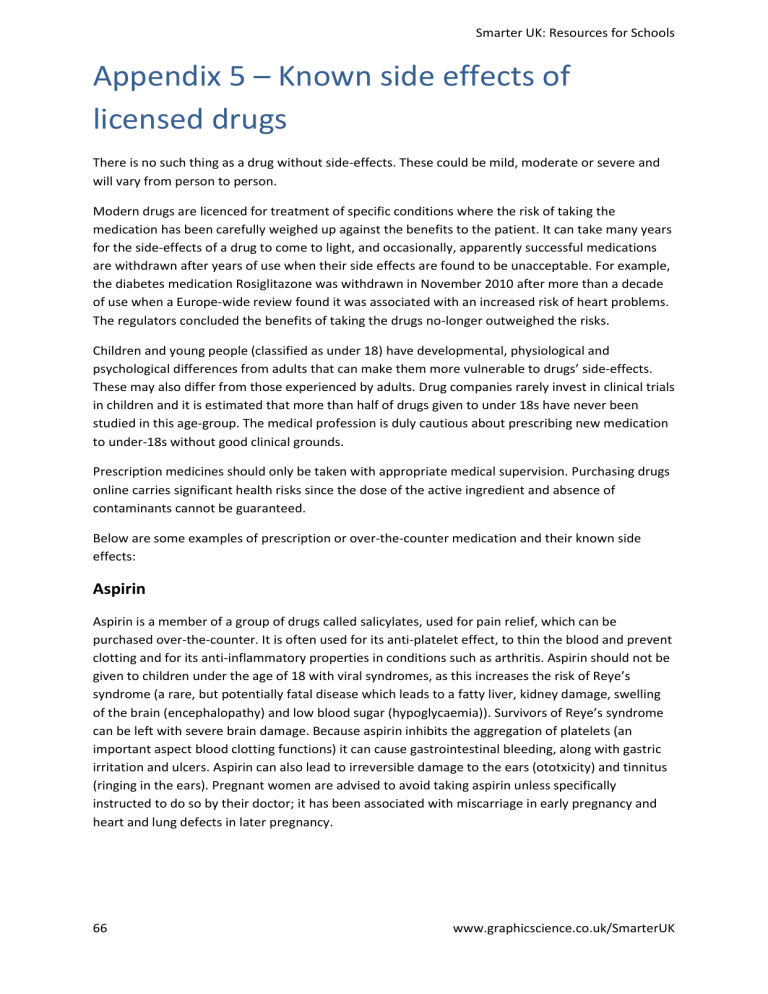
Smarter UK: Resources for Schools
Appendix 5 – Known side effects of licensed drugs
There is no such thing as a drug without side-effects. These could be mild, moderate or severe and will vary from person to person.
Modern drugs are licenced for treatment of specific conditions where the risk of taking the medication has been carefully weighed up against the benefits to the patient. It can take many years for the side-effects of a drug to come to light, and occasionally, apparently successful medications are withdrawn after years of use when their side effects are found to be unacceptable. For example, the diabetes medication Rosiglitazone was withdrawn in November 2010 after more than a decade of use when a Europe-wide review found it was associated with an increased risk of heart problems.
The regulators concluded the benefits of taking the drugs no-longer outweighed the risks.
Children and young people (classified as under 18) have developmental, physiological and psychological differences from adults that can make them more vulnerable to drugs’ side-effects.
These may also differ from those experienced by adults. Drug companies rarely invest in clinical trials in children and it is estimated that more than half of drugs given to under 18s have never been studied in this age-group. The medical profession is duly cautious about prescribing new medication to under-18s without good clinical grounds.
Prescription medicines should only be taken with appropriate medical supervision. Purchasing drugs online carries significant health risks since the dose of the active ingredient and absence of contaminants cannot be guaranteed.
Below are some examples of prescription or over-the-counter medication and their known side effects:
Aspirin
Aspirin is a member of a group of drugs called salicylates, used for pain relief, which can be purchased over-the-counter. It is often used for its anti-platelet effect, to thin the blood and prevent clotting and for its anti-inflammatory properties in conditions such as arthritis. Aspirin should not be given to children under the age of 18 with viral syndromes, as this increases the risk of Reye’s syndrome (a rare, but potentially fatal disease which leads to a fatty liver, kidney damage, swelling of the brain (encephalopathy) and low blood sugar (hypoglycaemia)). Survivors of Reye’s syndrome can be left with severe brain damage. Because aspirin inhibits the aggregation of platelets (an important aspect blood clotting functions) it can cause gastrointestinal bleeding, along with gastric irritation and ulcers. Aspirin can also lead to irreversible damage to the ears (ototxicity) and tinnitus
(ringing in the ears). Pregnant women are advised to avoid taking aspirin unless specifically instructed to do so by their doctor; it has been associated with miscarriage in early pregnancy and heart and lung defects in later pregnancy.
66 www.graphicscience.co.uk/SmarterUK
Smarter UK: Resources for Schools
Epilim
Epilim, which contains the anti-convulsant sodium valproate, is widely used to treat many types of epilepsy. It has been found to be effective in reducing seizures in people with epilepsy but it has a long list of side effects. Its common effects include: tiredness, tremors, weight gain, abdominal problems, double vision, insomnia and hair loss. It can also cause problems with menstruation (in some cases halting it altogether) and can lead to depression, abnormal dreams and agitation. Some of the more serious side effects include the risk of inflammation or damage to the liver and, when taking high doses, a shortage of blood platelets and an increased risk of bleeding around the brain.
Epilim should not be taken by women who wish to become pregnant due to its high potential to cause birth defects such as spina bifida, developmental problems and facial changes known as
‘foetal valproate syndrome’.
Hydrocortisone Cream
Hydrocortisone cream contains a type of medicine called a topical corticosteroid – used for reducing inflammation. It can be used to treat a variety of inflammatory skin complaints, including reactions to plants, insect bites, jewellery, cosmetics and toiletries. It is also used to treat eczema and is sometimes used to treat acne. It works by acting inside cells to decrease the release of inflammatory substances. Side effects can include: drying or cracking of the skin, itching, burning and skin discolouration. It can even cause acne. Some people suffer from severe allergic reactions to hydrocortisone cream such as contact dermatitis, swelling of the face, lips and tongue, hives, rashes and difficulty breathing.
Paracetamol
Paracetamol is widely used medicine taken as a pain reliever (analgesic) and to reduce fever
(antipyretic). An overdose of paracetamol can cause potentially fatal liver damage and is one of the most common causes of poisoning worldwide. Paracetamol toxicity is the number one cause of acute liver failure in the western world. The threshold for overdose is lowered through alcohol consumption, taking prescription medications or from being under-nourished. Prolonged daily use of paracetamol may cause liver or kidney damage.
Prozac
Prozac (a commercial name for fluoxetine) is one of a number of SSRIs (Selective Serotonin Reuptake
Inhibitors) used to treat forms of depressions such as major depressive disorder and pre-menstrual dysphoric disorder (PMDD); panic disorders; obsessive compulsive disorder (OCD) and bulimia nervosa. Its common side effects include: anxiety, headaches, nausea, insomnia, increased sweating and decreased sexual appetite. Less common side effects include agitation, impulsiveness, tremors and hyperactivity. It can even cause more serious problems such as seizures, hallucinations and problems with balance and coordination. Paradoxically, considering its role in treating depressive disorders, Prozac and other anti-depressants have been known to increase suicidal ideation (suicidal thoughts). Taking Prozac during the 3 rd trimester of pregnancy may increase the baby’s risk of developing a serious and potentially fatal lung disorder: persistent pulmonary hypotension.
67 www.graphicscience.co.uk/SmarterUK
